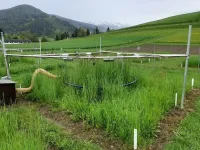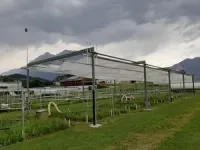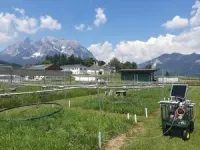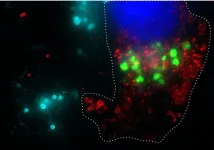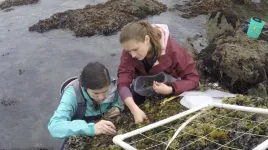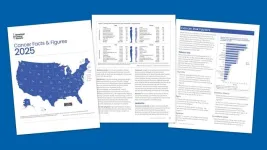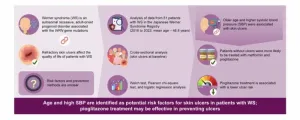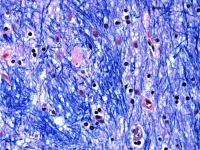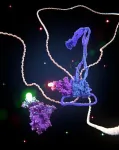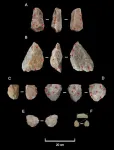(Press-News.org) New research co-led by the University of Maryland reveals that drought and increased temperatures in a CO2-rich climate can dramatically alter how grasslands use and move water. The study provides the first experimental demonstration of the potential impacts of climate change on water movement through grassland ecosystems, which make up nearly 40% of Earth’s land area and play a critical role in Earth’s water cycle. The study appears in the January 17, 2025, issue of the journal Science.
“If we want to predict the effects of climate change on Earth’s water resources, we need data showing how the hydrologic cycle will respond at a small scale where we can define mechanisms, but that just hasn’t been available,” said Jesse Radolinski corresponding author of the study, a post-doctoral research associate in the UMD Department of Environmental Science & Technology who began the work at the University of Innsbruck. “Our experiments found that under summer drought conditions, and higher air temperatures that are expected under a future with elevated CO2, two things change fundamentally: One, the structural properties of the soil in the root zone change so that water flows differently than we expected, and two, these altered climate conditions and soil properties cause the plants to access water differently.”
Currently, new rainfall tends to linger in the root zone where it mixes with existing soil water (i.e., previous rainfall) before percolating into local streams and rivers. Radolinski said this study suggests that under future climate conditions, intense rainfall may move more quickly through the soil into local water bodies, interacting less with this stored water and potentially bringing nutrients and pollutants with it. In addition, plants subjected to these future drought conditions conserve more water, releasing less back to the atmosphere through transpiration. That could mean less atmospheric cooling, triggering a feedback loop of more drought and more warming.
Radolinski and his colleagues conducted their experiment with the University of Innsbruck in open plots in an Austrian grassland. They simulated six different climate conditions by manipulating air temperature and CO2 levels, and introducing recurring drought with large, automatically deployed shelters that prevented natural rainfall from reaching the plots. When they simulated rainfall, they used water with a traceable isotope of hydrogen called deuterium, and then tracked its path through the plants and the soil.
Their results showed that after recurring droughts in plots with elevated CO2 and warming, the structure of pores in the soil changed so that older water could remain locked in smaller pores, while newer water flowed into larger pores that drained more quickly. In addition, the plants were effective at accessing the most readily available soil moisture and conserved water loss by releasing less to the atmosphere through transpiration. This may help plants adapt to water stress under future drought conditions, though more research is needed to tease out the effects on growth.
The study reveals that soil and plant water interactions could be much more complex than previously thought, with significant consequences for the ability of ecosystems to withstand and recover from drought. These insights will be critical in informing conservation strategies and managing ecosystems in a rapidly changing climate.
---------
Radolinski completed his fellowship as a post-doctoral research associate in the laboratory of Dr. Gurpal Toor in January, 2025. The study was an international collaboration co-led by researchers at the University of Innsbruck.
END
New study reveals how climate change may alter hydrology of grassland ecosystems
UMD researcher finds shallow groundwater mixes less with rainwater and plants conserve more following drought in warmer, high-CO2 conditions
2025-01-16
ELSE PRESS RELEASES FROM THIS DATE:
Polymer research shows potential replacement for common superglues with a reusable and biodegradable alternative
2025-01-16
EMBARGO: THIST CONTENT IS UNDER EMBARGO UNTIL 2 PM U.S. EASTERN STANDARD TIME ON JANUARY 16, 2025. INTERESTED MEDIA MAY RECIVE A PREVIEW COPY OF THE JOURNAL ARTICLE IN ADVANCE OF THAT DATE OR CONDUCT INTERVIEWS, BUT THE INFORMATION MAY NOT BE PUBLISHED, BROADCAST, OR POSTED ONLINE UNTIL AFTER THE RELEASE WINDOW.
Researchers at Colorado State University and their partners have developed an adhesive polymer that is stronger than current commercially available options while also being biodegradable ...
Research team receives $1.5 million to study neurological disorders linked to long COVID
2025-01-16
The National Institute of Mental Health has awarded a significant grant of $1.5 million to Jianyang Du, PhD, of the University of Tennessee Health Science Center, for a research study aimed at uncovering the cellular and molecular mechanisms that lead to neurological disorders caused by long COVID-19.
Dr. Du is an associate professor at the College of Medicine in the Department of Anatomy and Neurobiology. Colleen Jonsson, PhD, director of the UT Health Science Center Regional Biocontainment Laboratory and professor in the Department of Microbiology, is co-investigator on the grant, and Kun Li, PhD, assistant ...
Research using non-toxic bacteria to fight high-mortality cancers prepares for clinical trials
2025-01-16
A University of Massachusetts Amherst-Ernest Pharmaceuticals team of scientists has made “exciting,” patient-friendly advances in developing a non-toxic bacterial therapy, BacID, to deliver cancer-fighting drugs directly into tumors. This emerging technology holds promise for very safe and more effective treatment of cancers with high mortality rates, including liver, ovarian and metastatic breast cancer.
Clinical trials with participating cancer patients are estimated to begin in 2027. “This is exciting because we now have all the critical pieces for getting an effective bacterial ...
Do parents really have a favorite child? Here’s what new research says
2025-01-16
Siblings share a unique bond built from shared memories, family rituals and the occasional argument. But ask almost anyone with a brother or sister and you’ll likely find a longstanding debate: who’s the favorite? New research from BYU sheds some light on that playful rivalry, revealing how parents might subtly show favoritism based on birth order, personality and gender.
The study, conducted by BYU School of Family Life professor Alex Jensen, found that younger siblings generally receive more favorable ...
Mussel bed surveyed before World War II still thriving
2025-01-16
A mussel bed along Northern California’s Dillon Beach is as healthy and biodiverse as it was about 80 years ago, when two young students surveyed it shortly before Pearl Harbor was attacked and one was sent to fight in World War II.
Their unpublished, typewritten manuscript sat in the UC Davis Bodega Marine Laboratory’s library for years until UC Davis scientists found it and decided to resurvey the exact same mussel bed with the old paper’s meticulous photos and maps directing their way.
The new findings, published in the journal Scientific Reports, document ...
ACS Annual Report: Cancer mortality continues to drop despite rising incidence in women; rates of new diagnoses under 65 higher in women than men
2025-01-16
ATLANTA, January 16, 2025 — The American Cancer Society (ACS) today released Cancer Statistics, 2025, the organization’s annual report on cancer facts and trends. The new findings show the cancer mortality rate declined by 34% from 1991 to 2022 in the United States, averting approximately 4.5 million deaths. However, this steady progress is jeopardized by increasing incidence for many cancer types, especially among women and younger adults, shifting the burden of disease. For example, incidence rates in women 50-64 years of age have surpassed those in ...
Fewer skin ulcers in Werner syndrome patients treated with pioglitazone
2025-01-16
“[…] the results of this study indicate that pioglitazone might be useful in treating refractory skin ulcers, a typical condition that reduces the quality of life of patients with WS.”
BUFFALO, NY- January 16, 2025 – A new research paper was published in Aging (listed by MEDLINE/PubMed as “Aging (Albany NY)” and “Aging-US” by Web of Science) Volume 16, Issue 22 on December 2, 2024, entitled “Less frequent skin ulcers among patients with Werner syndrome treated with pioglitazone: findings from the Japanese Werner Syndrome Registry.”
Scientists ...
Study finds surprising way that genetic mutation causes Huntington’s disease, transforming understanding of the disorder
2025-01-16
Scientists at the Broad Institute of MIT and Harvard, Harvard Medical School, and McLean Hospital have discovered a surprising mechanism by which the inherited genetic mutation known to cause Huntington’s disease leads to the death of brain cells. The findings change the understanding of the fatal neurodegenerative disorder and suggest potential ways to delay or even prevent it.
For 30 years, researchers have known that Huntington’s is caused by an inherited mutation in the Huntingtin (HTT) gene, but they didn’t ...
DNA motors found to switch gears
2025-01-16
Scientists from Delft, Vienna, and Lausanne discovered that the protein machines that shape our DNA can switch direction. Until now, researchers believed that these so-called SMC motors that make loops into DNA could move in one direction only. The discovery, which is published in Cell, is key to understanding how these motors shape our genome and regulate our genes.
Connecting DNA
“Sometimes, a cell needs to be quick in changing which genes should be expressed and which ones should be turned off, for example in response to food, alcohol or heat. To turn genes off and on, cells use Structural Maintenance ...
Human ancestor thrived longer in harsher conditions than previous estimates
2025-01-16
An early human ancestor of our species successfully navigated harsher and more arid terrains for longer in Eastern Africa than previously thought, according to a new study published in Nature Communications Earth & Environment.
Homo erectus, the first of our relatives to have human-like proportions and the first known early human to migrate out of Africa, was the focus of the new study led by the international research team.
The researchers analysed evidence from Engaji Nanyori in Tanzania’s Oldupai Gorge, revealing Homo erectus thrived ...
LAST 30 PRESS RELEASES:
Brainwaves of mothers and children synchronize when playing together – even in an acquired language
A holiday to better recovery
Cal Poly’s fifth Climate Solutions Now conference to take place Feb. 23-27
Mask-wearing during COVID-19 linked to reduced air pollution–triggered heart attack risk in Japan
Achieving cross-coupling reactions of fatty amide reduction radicals via iridium-photorelay catalysis and other strategies
Shorter may be sweeter: Study finds 15-second health ads can curb junk food cravings
Family relationships identified in Stone Age graves on Gotland
Effectiveness of exercise to ease osteoarthritis symptoms likely minimal and transient
Cost of copper must rise double to meet basic copper needs
A gel for wounds that won’t heal
Iron, carbon, and the art of toxic cleanup
Organic soil amendments work together to help sandy soils hold water longer, study finds
Hidden carbon in mangrove soils may play a larger role in climate regulation than previously thought
Weight-loss wonder pills prompt scrutiny of key ingredient
Nonprofit leader Diane Dodge to receive 2026 Penn Nursing Renfield Foundation Award for Global Women’s Health
Maternal smoking during pregnancy may be linked to higher blood pressure in children, NIH study finds
New Lund model aims to shorten the path to life-saving cell and gene therapies
Researchers create ultra-stretchable, liquid-repellent materials via laser ablation
Combining AI with OCT shows potential for detecting lipid-rich plaques in coronary arteries
SeaCast revolutionizes Mediterranean Sea forecasting with AI-powered speed and accuracy
JMIR Publications’ JMIR Bioinformatics and Biotechnology invites submissions on Bridging Data, AI, and Innovation to Transform Health
Honey bees navigate more precisely than previously thought
Air pollution may directly contribute to Alzheimer’s disease
Study finds early imaging after pediatric UTIs may do more harm than good
UC San Diego Health joins national research for maternal-fetal care
New biomarker predicts chemotherapy response in triple-negative breast cancer
Treatment algorithms featured in Brain Trauma Foundation’s update of guidelines for care of patients with penetrating traumatic brain injury
Over 40% of musicians experience tinnitus; hearing loss and hyperacusis also significantly elevated
Artificial intelligence predicts colorectal cancer risk in ulcerative colitis patients
Mayo Clinic installs first magnetic nanoparticle hyperthermia system for cancer research in the US
[Press-News.org] New study reveals how climate change may alter hydrology of grassland ecosystemsUMD researcher finds shallow groundwater mixes less with rainwater and plants conserve more following drought in warmer, high-CO2 conditions
